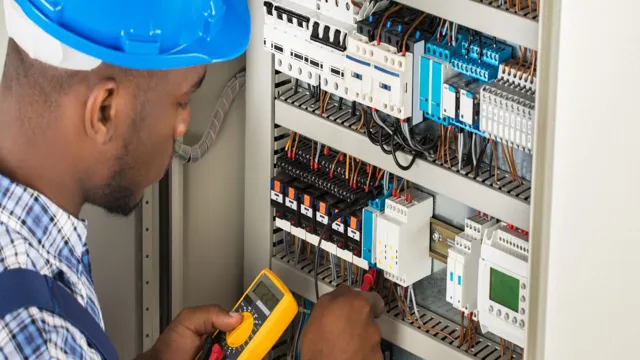Powering up your future with Electrical Technology: A guide to pursuing a rewarding career in the field
Have you ever given a thought to how crucial the electrical tech career field is to our everyday lives? Without this field, we wouldn’t have electricity to power our homes, smartphones, and other devices. The technological development that we see today is made possible by skilled electrical technicians, who work round the clock to ensure that everything functions smoothly. In this blog post, we’ll dive deeper into the world of electrical tech and discover how it has evolved over time.
We’ll look at the different career paths you can take in this field and explore the skills and qualities that are essential for success. So, whether you’re a high school student trying to decide on a career path or someone looking to switch careers, keep reading to find out more about the exciting world of electrical tech!
Overview of Electrical Technology Field
Electrical technology is a fascinating field that encompasses a wide range of industries. It involves the design, installation, and operation of electrical systems used in different applications such as power generation, transmission, and distribution. An electrical technology career field is an excellent path for individuals who enjoy using their analytical and problem-solving abilities to develop solutions for complex issues.
The industries that hire electrical technologists are numerous and include power distribution companies, renewable energy companies, and manufacturing plants. With the rise in renewable energy sources and the increasing demand for energy-efficient systems, the need for professionals in this field is growing. A career in electrical technology provides a stable and financially rewarding pathway with excellent opportunities for growth and advancement.
Job Responsibilities in Electrical Technology
When it comes to the field of electrical technology, there is always a high demand for professionals who possess the necessary skills and knowledge to work with electrical systems and equipment. From designing and installing electrical systems to repairing and maintaining them, electrical technicians play a pivotal role in ensuring that power flows smoothly and safely to homes, businesses, and various industries. They are also responsible for testing electrical components, troubleshooting problems, and updating systems to keep them up-to-date with the latest technology.
Electrical technology is a diverse field, encompassing everything from residential and commercial wiring to industrial automation and control systems. With the growing demand for energy-efficient and sustainable solutions, there is an increasing focus on renewable energy technologies like wind and solar power, which has opened up new opportunities for professionals in this field. Overall, the field of electrical technology offers a challenging yet rewarding career path for those who have a passion for innovation and problem-solving.

Industry Demand for Electrical Techs
Electrical Technology Field The electrical technology field is an ever-growing industry, with immense demand for skilled professionals in the field. Electrical technicians are responsible for installing, maintaining, and repairing electrical systems that power modern technology and equipment. Several industries require the expertise of electrical technicians, including manufacturing, telecommunications, healthcare, construction, and transportation.
Due to the continuously advancing nature of technology, electrical technicians must stay up-to-date with new advancements and techniques. This industry is constantly evolving, and there is an increasing demand for technicians with skills in renewable energy, sustainable technologies, and energy-efficient systems. As such, the electrical technology field provides an exciting and challenging career prospect with a high potential for growth and success.
Education and Certifications
If you are interested in pursuing a career in the electrical technology field, it is important to understand the educational requirements and certifications needed for success. One of the most common paths is the completion of an associate or bachelor’s degree in electrical engineering or a related field. These programs provide a solid foundation in electrical theory, design, and troubleshooting, as well as exposure to hands-on practical experience.
However, not all employers require a degree, and many offer on-the-job training or apprenticeships as an alternative. Additionally, there are many certifications available that can increase your skills and make you more marketable to potential employers. Some examples include the Certified Electrical Technician (CET) or the National Electric Code (NEC) certification.
Ultimately, the key to success in this field is a combination of education, experience, and a willingness to continuously learn and adapt to new technologies and techniques.
Educational Requirements for Electrical Techs
When it comes to becoming an electrical technician, education and certifications play a crucial role. Most employers prefer individuals who have completed post-secondary education in electrical technology or a related field. An associate’s degree in electrical engineering technology or a diploma in electrical technology from a vocational school is a good start.
Additionally, many states require that electrical technicians be licensed or certified. To obtain a license, one must pass an exam after meeting the qualifications, which vary by state. Certifications, such as those offered by the National Institute for Certification in Engineering Technologies (NICET) can also demonstrate a technician’s level of skill and knowledge.
NICET certifications require a combination of experience, education, and passing a written exam. Ultimately, obtaining the necessary education and certifications can help electrical technicians advance in their careers, as well as improve their chances of finding employment.
Certifications for Advancement in Electrical Tech Career
As technology advances, the role of electricians has become more complex, requiring them to stay up-to-date on the latest industry advances. Pursuing education and certifications in electrical technology not only enhances an electrician’s professional development but also provides them with a competitive advantage in their career. There are several certifications available for electricians, such as the Journeyman Electrician Certification, Master Electrician Certification, and the Certified Electrical Safety Compliance Professional.
Each of these certifications validates the electrician’s skill set and knowledge, giving customers confidence in their work. Pursuing education and certifications not only leads to increased job opportunities but also higher salaries, making it a worthwhile investment in an electrician’s career. In conclusion, education and certifications are significant factors in the advancement of an electrician’s career, and staying current with advancements in the industry is crucial for success.
Continuing Education and Training
When it comes to career growth and advancement, education and certifications are crucial. In today’s ever-evolving job market, it’s essential to continuously enhance your skills and knowledge to stay ahead of the game. There are various options available for continuing education and training, such as online courses, workshops, seminars, and conferences.
These programs provide an opportunity to develop new skills, learn about new technologies and trends, and network with industry professionals. Additionally, obtaining industry-specific certifications demonstrates your expertise and commitment to your profession. Certifications often require passing a comprehensive exam to prove mastery of a particular subject, and they provide a competitive advantage when applying for jobs or promotions.
Investing in education and certifications shows that you’re dedicated to your career and are willing to go above and beyond to achieve your goals.
Career Paths in Electrical Technology
Electrical technology is a diverse and dynamic career field that offers a wide range of career paths to choose from. Whether you’re seeking an entry-level position or a high-level role, there is a path for everyone in this field. One of the most popular career paths in electrical technology is electrical engineering.
Electrical engineers are responsible for designing, developing, and maintaining new and existing electrical systems and products. Another promising career path is becoming an electrician, which involves installing, repairing, and maintaining electrical systems in buildings, homes, and other structures. Other career options in electrical technology include jobs in renewable energy, such as solar and wind power, as well as in research and development to create new technologies that make electrical systems more efficient and sustainable.
Whether you’re interested in hands-on work or more research-oriented work, the electrical technology career field has something for you to pursue.
Entry-Level Positions in Electrical Tech
Electrical technology is a challenging field that offers a wide variety of career paths for those interested in working with electrical devices. Entry-level positions in electrical tech require specific skills and knowledge, such as the ability to read and interpret electrical schematics, diagnostic tests, and other technical documents. Some common entry-level roles in electrical tech include electrical technician, electrician apprentice, and maintenance technician.
Electrical technicians typically work in manufacturing and testing environments, installing and troubleshooting electrical equipment. Electrician apprentices receive on-the-job training while attending apprenticeship programs to learn the ins and outs of electrical installations, maintenance, and repair. Lastly, maintenance technicians operate and maintain electrical equipment, ensuring it runs efficiently and continues to meet safety standards.
Regardless of the entry-level position, there are several career paths in electrical tech, including design and development, installation and maintenance, automation and controls, and power systems. As with any career path, dedication, hard work, and a willingness to learn are essential to succeed in electrical technology.
Advanced Career Paths in Electrical Tech
As an aspiring electrical technician, you have a vast array of career paths to choose from. The field of electrical technology is quite diverse, and you have the opportunity to specialize in specific areas based on your interest and expertise. One of the most advanced career paths in electrical tech is becoming an Electrical Engineer.
Electrical Engineers design, develop, and test electrical systems and equipment. They also supervise the installation and operation of these devices. Another career path available is becoming a Power Systems Engineer, which involves designing and maintaining power systems that help provide electricity to homes, businesses, and industries.
You could also specialize in Renewable Energy Engineering, which focuses on turning renewable resources into energy, such as solar or wind energy. The possibilities are endless, and you can even attain higher-level positions such as becoming a Project Manager or a Technical Director. The key to exploring advanced career paths in electrical tech is to be passionate about the field, acquire necessary skills and qualifications and always be open to learning new techniques and technologies.
Salary and Job Outlook in Electrical Technology Field
If you’re interested in pursuing a career in electrical technology, you’ll be happy to know that the job outlook is promising. According to the Bureau of Labor Statistics, employment in this field is projected to grow by 8 percent from 2019 to 2029, which is higher than the average for all occupations. As for salaries, electrical technicians make an average of $64,330 per year, while electrical engineers make an average of $101,250 per year.
Of course, actual salary ranges will depend on factors such as experience, location, and industry. But overall, the electrical technology career field offers stable job growth and competitive salaries. As technology continues to advance, demand for qualified electrical professionals will only continue to increase.
So if you’re interested in working with electronics, designing electrical systems, or troubleshooting electrical issues, this could be a great career path to explore.
Conclusion
In conclusion, choosing a career in electrical technology is like becoming a superhero with the power to bring light and power to the world. You get to work with cutting-edge technology, solve complex problems, and help to shape the future of our society. So, if you’re looking to spark your career and light up your future, consider a path in electrical technology – it’s truly electric!”
FAQs
What is electrical technology?
Electrical technology is a field that deals with the study and application of electrical systems and devices, including power generation, transmission, and distribution systems, as well as electronic and digital circuits and systems.
What are some career options in the electrical technology field?
There are many career paths in the electrical technology field, including electrician, electrical engineer, power systems engineer, telecommunications technician, automation and control engineer, and renewable energy systems specialist.
What education and training do I need to pursue a career in electrical technology?
Depending on the specific career path, you may need postsecondary education such as an associate’s degree, bachelor’s degree, or technical diploma. You may also need to obtain certifications or licenses, depending on your profession and location.
What are some of the current trends and future prospects in the electrical technology field?
Some of the current trends and future prospects in the electrical technology field include the expansion of renewable energy technologies, the integration of digital and smart technologies into power systems, and the continued growth of the telecommunications industry. Additionally, there is a growing need for skilled professionals to maintain and upgrade aging power infrastructure.




